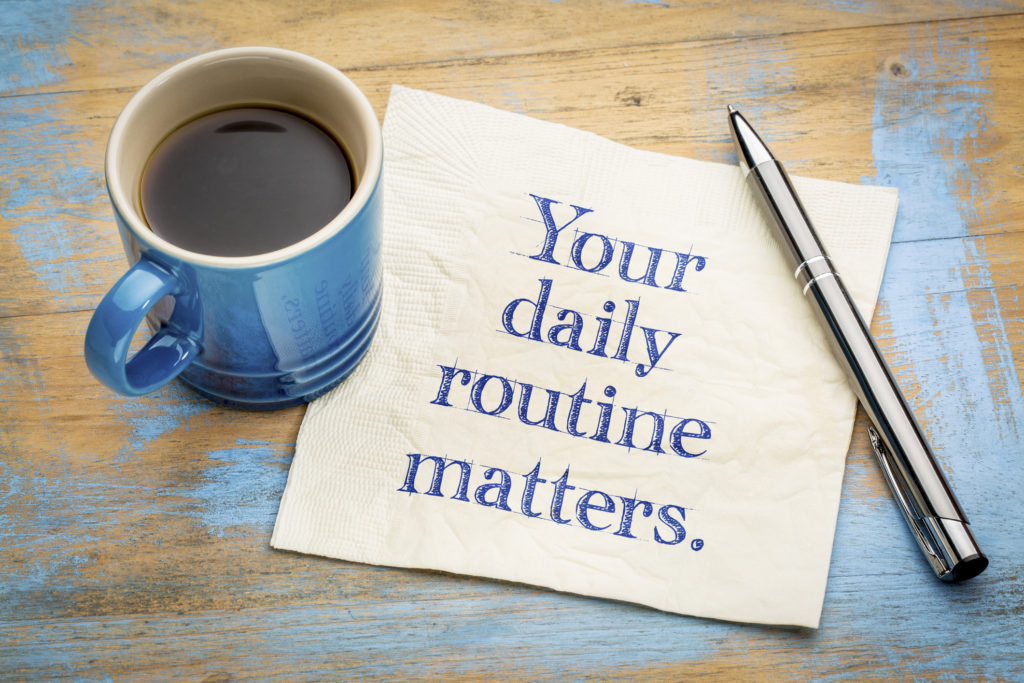Creating a daily routine is a challenge at any time. But it has never been more challenging than during the time of Covid-19. The very tasks and rituals that at one time provided the anchors for your day are, in many cases, optional and may even feel meaningless. That’s why creating your own personal rituals is critical to accomplishing pretty much anything, but also for helping your own mental health.
The Simple Rituals That Were
We might never have acknowledged, until recently, that the very simple rituals of waking up at the same time every day, bathing, actually getting dressed and having a daily “to do” list were not burdens but organizing elements that helped to provide meaning and a sense of accomplishment during the day.
Routines help us mark time. And accomplishments help fuel our day and help us feel joy, satisfaction and a sense of feeling useful. How simple is that? But it’s true.
The Simple Rituals That Help
Aside from maintaining the rituals from our pre-covid days, the single most helpful ritual to incorporate into your daily routine is movement and exercise.
Racheal Cook, a business strategist and productivity expert, has been working from home for the past decade.She suggests setting up a dedicated workspace, even if it’s just the corner of your kitchen table and using the Pomodoro Technique: Stay focused and work for about 25 minutes, then take a 5-minute break to get water, stretch, or take a walk down the street.
Create time for exercise. I am especially bad at this because I get wrapped up in projects or have to stay ready – ie clean, for the next Zoom meeting. But setting aside a specific day and time to address personal fitness will actually help your overall health, mood and mental sharpness.
According to Better Health, an Australian fitness channel, exercise can have an enormous impact on your mood. In fact, it is thought that exercise can be just as effective as anti-depressants in treating mild-to-moderate depression.
Not only can exercise help in treating depression, it can also prevent people from becoming depressed again. So it’s important to keep up an exercise regimen after people get better.
We don’t yet understand exercise and mood enough to know exactly which type of exercise is best – or how much – but what we do know is that it definitely has a positive effect.
Exercise can:
- increase your energy levels
- help you get a good night’s sleep
- distract you from your worries and get you out of a cycle of negative thoughts that can feed anxiety and depression
- help you get out and be with people if you’re feeling lonely; even a smile as you pass someone on the street can boost your mood
- help you feel more in control, and improve your self-esteem, because you are taking an active role in your own treatment
- increase your confidence as you meet challenges and reach goals, no matter how small, as well as helping you to feel good about your body
- help you to avoid less helpful approaches, such as drinking alcohol or dwelling on how you feel.
Beyond Exercise
Creating a daily routine is about scheduling time for the things that can add structure to your day like exercise, set meal times and healthy eating. But recognizing that certain activities can lead you down a rabbit hole of mindless unaccounted for time is also something of which to become aware.
Set an intention for your day. Decide what it is you would like to accomplish. An intention might encompass tangible goals like finish a work project or clean out a closet. But an intention can also reflect on your desire to change a way of thinking or engaging with the news or social media.
An intention creates a deliberate plan – or goal – for how you would like to live that day. Your intention doesn’t necessarily need to reflect a permanent goal, only today’s goal. A little bit of mindfulness creates an internal environment for reflection and deliberate action.
Learning How to End Your Day
In these unusual times, it is just as important to learn how to end your day as learning how to organize your day. Setting a time to “switch off” the business/school day and transition to “me time” or “family time” presents opportunities for discovery that aren’t usually available to us as we live our busy pre-covid lives.
Make sure you set a time to turn off your computer and stop looking at emails. Spending time with your family, cooking meals together and reconnecting not only serve to mark time but to make the most of this unusual opportunity to fully engage with our families on a one to one level. That can be very satisfying.
Additional Tips
The tips that have been outlined in this blog merely scratch the surface. Please join Chandler Hall’s special virtual seminar series on the Benefits of a Daily Routine.
1-21-2021 – The Health Benefits of Daily Routine
2-4-2021 – The Anchors of a Supportive Daily Routine
2-18-2021 – Designing Your Best Day
